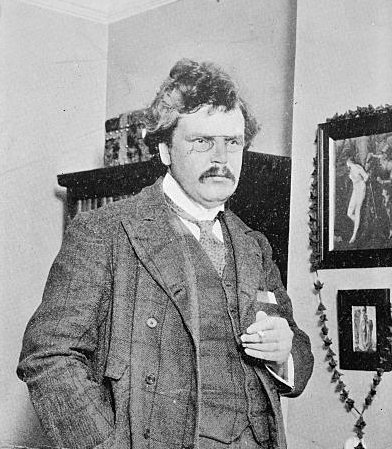Tag Archives: slaboduchost
Eugenics and Other Evil (6): The Unanswered Challenge
Dr. Saleeby did me the honour of referring to me in one of his addresses on this subject, and said that even I cannot produce any but a feeble-minded child from a feeble-minded ancestry. To which I reply, first of all, that he cannot produce a feeble-minded child. The whole point of our contention is that this phrase conveys nothing fixed and outside opinion. There is such a thing as mania, which has always been segregated; there is such a thing as idiocy, which has always been segregated; but feeble-mindedness is a new phrase under which you might segregate anybody. It is essential that this fundamental fallacy in the use of statistics should be got somehow into the modern mind. Such people must be made to see the point, which is surely plain enough, that it is useless to have exact figures if they are exact figures about an inexact phrase. If I say, „There are five fools in Action,“ it is surely quite clear that, though no mathematician can make five the same as four or six, that will not stop you or anyone else from finding a few more fools in Action. Now weak-mindedness, like folly, is a term divided from madness in this vital manner — that in one sense it applies to all men, in another to most men, in another to very many men, and so on. It is as if Dr. Saleeby were to say, „Vanity, I find, is undoubtedly hereditary. Here is Mrs. Jones, who was very sensitive about her sonnets being criticized, and I found her little daughter in a new frock looking in the glass. The experiment is conclusive, the demonstration is complete; there in the first generation is the artistic temperament — that is vanity; and there in the second generation is dress — and that is vanity.“ We should answer, „My friend, all is vanity, vanity and vexation of spirit — especially when one has to listen to logic of your favourite kind. Obviously all human beings must value themselves; and obviously there is in all such evaluation an element of weakness, since it is not the valuation of eternal justice. What is the use of your finding by experiment in some people a thing we know by reason must be in all of them?“
Here it will be as well to pause a moment and avert one possible misunderstanding. I do not mean that you and I cannot and do not practically see and personally remark on this or that eccentric or intermediate type, for which the word „feeble-minded“ might be a very convenient word, and might correspond to a genuine though indefinable fact of experience. In the same way we might speak, and do speak, of such and such a person being „mad with vanity“ without wanting two keepers to walk in and take the person off. But I ask the reader to remember always that I am talking of words, not as they are used in talk or novels, but as they will be used, and have been used, in warrants and certificates, and Acts of Parliament. The distinction between the two is perfectly clear and practical. The difference is that a novelist or a talker can be trusted to try and hit the mark; it is all to his glory that the cap should fit, that the type should be recognized; that he should, in a literary sense, hang the right man. But it is by no means always to the interest of governments or officials to hang the right man. The fact that they often do stretch words in order to cover cases is the whole foundation of having any fixed laws or free institutions at all. My point is not that I have never met anyone whom I should call feeble-minded, rather than mad or imbecile. My point is that if I want to dispossess a nephew, oust a rival, silence a blackmailer, or get rid of an importunate widow, there is nothing in logic to prevent my calling them feeble-minded too. And the vaguer the charge is the less they will be able to disprove it.


